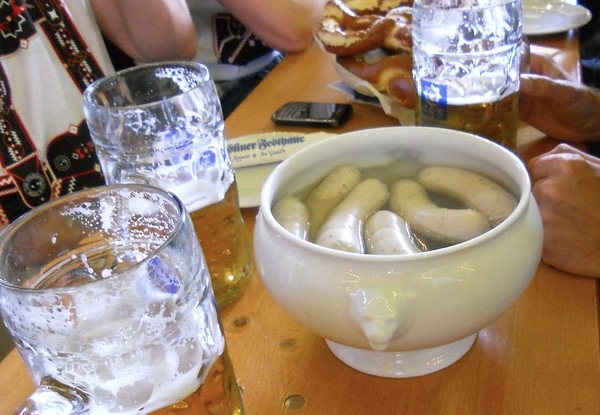20/04/23
Known as a “Weißwurstfrühstück”, this traditional sausage-pretzel-and-beer- breakfast might be Germany’s most “German” meal.
Click HERE to download the Weekly English Practice as a PDF.
Useful Vocabulary
to tuck into: to ingest food and drink heartily
offal: the internal organs of animals used as food
to flock to: to move or go together in a crowd revelry: lively and noisy festivities usually involving a large amount of alcohol
to poach: to cook s.t. in a small quantity of liquid veal: the meat of a young cow, used as food innkeeper: a person who runs an inn (pub/tavern) gamble: a risky action taken with the hope of success
siblings: brothers and sisters
to abide by: to accept or act in accordance to a rule, decision or recommendation
to debut: (of a new product) to be launched
Listen to the audio and read the text.
Where people drink beer for breakfast
Many places around the world have unique morning traditions. In Lyon, France, people tuck into wine and offal at 9am. In Van, Turkey, it’s typical to sit down to a nine-plate breakfast spread. And in Trang, Thailand, it’s not unusual to flock to dim sum halls before sunrise. In Bavaria, a state known for its traditional clothing and Oktoberfest revelry, this culinary custom reflects the local joie de vivre.
“A Weißwurstfrühstück (literally: ‘white-sausage breakfast’) is more than just a meal; it’s an excuse for an informal get-together when it’s too late for coffee but too early for lunch,” said Frauke Rothschuh from the Munich tourism board, adding that people normally end up staying to enjoy the atmosphere and, of course, the beer.
The precise origins of Weißwürste – poached white sausages made with veal, back bacon, onion, parsley and spices – are unclear. The most popular story, however, is that they were invented by accident. In 1857, young Munich innkeeper Sepp Moser ran out of sheep casings for his sausages so he used pork ones instead. Worried they might burst upon frying, Moser decided to cook them in water – a gamble that paid off.
Today they are one of the best-known Bavarian foods, and one of the first things locals will tell you to try. The breakfast is eaten across the southern state, especially in Oberbayern (Upper Bavaria). “It’s a meal I associate with my family in the countryside,” said Theresa Portenlänger, who runs the modern Munich pub Xaver’s with her siblings. “We always have a Weißwurstfrühstück together on Christmas eve.”
When I asked her about the idea of drinking beer in the morning, she said, “I think a lot of people here don’t really see it as something alcoholic – it’s almost more of a staple food, like bread!”
Traditionally, the sausages should be consumed before the church bells ring at midday, reflecting a time before refrigeration and different preparation techniques. While this is no longer necessary, many places and locals still abide by it. Others, including Wallner and Portenlänger, now serve them past this cut-off, but it does feel odd ordering them late in the afternoon.
In 2022, Munich-based Greenforce – one of the fastest growing start-ups in Germany – debuted vegan white sausages at Oktoberfest. “Just five years ago this would have seemed very unlikely,” said CEO and founder Thomas Isermann, “but the positive reception of our products demonstrates how conscious nutrition also applies to events like Oktoberfest, however traditional they may be”.
The company will be the main vegan provider for Oktoberfest in 2023 and supplies several restaurants in the city. Made in Germany using pea protein, the sausages have 76% less fat and 62% fewer calories.
Adapted from this article by ECP coach Darren ‘Kez’ Kurien
Let’s chat about that
- Do you like tucking into offal?
- Would you like to eat a nine-course breakfast spread (a large, elaborate meal)?
- What is the earliest time you would think about consuming alcohol? Tell us why.
- What’s the biggest gamble you have taken which paid off?
- Would you like to go to the Oktoberfest and try a Weißwurstfrühstück? (See text.)
- Where do you think the best sausages are made? Britain, Spain, Germany or somewhere else?

